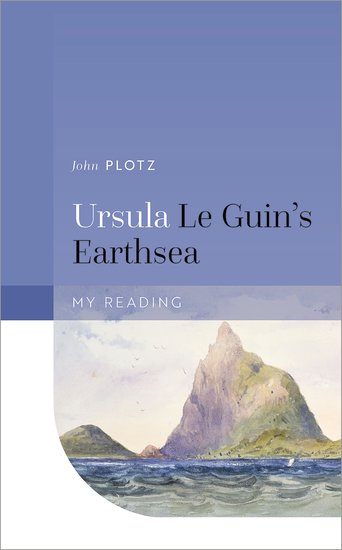John Plotz
 Barbara Mandel Professor of the Humanities
Barbara Mandel Professor of the HumanitiesCo-Founder, Brandeis Educational Justice Initiative
(education in the criminal justice system)
PhD, Harvard University
Editor, "B-Sides" (Public Books)
Faber Fellow in Humanities, Princeton University, Fall 2022
ORCID
Co-Host, Recall This Book podcast (episodes on minimalism, new media, addiction, Circe, etc.)
Meet Professor Plotz through OpenBook: An English Department Podcast.
Research Interests
Victorian literature, the novel, science fiction and fantasy
Awards
- Eberhard L. Faber Visiting Fellow in the Humanities Council and Department of English at Princeton University, 2022-23
- Nahum Glatzer Teaching Scholar Award, 2021-22
- Fellowship, Newhouse Center for the Humanities, 2018-19
- Guggenheim Fellowship, 2011-12
- Fellowship at the Radcliffe Institute for Advanced Study, 2011-12
- Brandeis University Dean of Arts and Sciences Mentoring Award, 2006-07
- Howard Foundation Fellowship for 2005-06
Selected Publications
Books
- "Ursula Le Guin’s Earthsea." Oxford University Press. August 2023.
- "B-Side Books: Essays on Forgotten Favorites." Columbia University Press, 2021.
- "Semi-Detached: The Aesthetics of Virtual Experience Since Dickens." Princeton University Press, 2017.
- "Portable Property: Victorian Culture on the Move." Princeton University Press, 2008.
- "The Crowd: British Literature and Public Politics." Berkeley: University of California Press, 2000.
Books and Articles (for a General Readership)
- "Time and the Tapestry: A William Morris Adventure." Illustrated by Phyllis Sarofff. Children's Book. (Bunker Hill Publishing, June, 2014). Reviews in Boston Globe, Minneapolis Star Tribune, Publishers Weekly, etc.
- B-Side: Georges Perec’s W, Or the Memory of Childhood (July 6, 2023).
- "Many into One, One into Many: George Lamming (1927-2022)." Public Books (July 15, 2022). Reprinted in 3 Quarks Daily.
- "Beverly Cleary Forever (1916-2021)." Public Books (April 12, 2021).
- "Buster Keaton Falls Up." Public Books (Nov. 13, 2020).
- "In Memoriam: Agnes Heller." Public Books (Sept. 5, 2019).
- "B-Side: Randall Jarrell, Pictures from an Institution." Public Books (March 6, 2019).
- "In Memoriam: Philip Roth." Public Books (May 28, 2018).
- "In Memoriam: Ursula K. Le Guin." Public Books (Jan. 29, 2018).
- "John Williams's Perfect Anti-Western." Public Books (May 1, 2016).
- "Nixon's Nemesis: Ursula Le Guin's Anarchist Aesthetics." Public Books (Oct. 15, 2015).
- "The Story's Where I Go: An Interview with Ursula Le Guin." Public Books (June 15, 2015).
- "Necessary Pleasures: How I Learned to Write, and Why." Writing for the Curious: Why Study Writing. Ed. Kishor Vaidya. (Curious Academic Publishing, 2015).
- "Jean Stafford, Antisocialite." Public Books (Jan. 6, 2014).
- "Zounds, Milady: At the Renaissance Faire." Slate (Feb. 2, 2013).
- "Feeling like a Stoic: Doris Lessing's Experimental Fiction." Public Books (Au. 7, 2012).
- "Ray Bradbury's Death." Slate. June 6, 2012.
- "What Do 'Where the Wild Things Are' and Lincoln's Gettysburg Address Have in Common?" Slate. May 8, 2012.
- "Their Noonday Demons, and Ours." The New York Times Book Review. Back-page Essay. Dec. 25, 2011.
- "This Book is 119 Years Overdue." Slate. No. 17, 2011.
- Brandeis Special Collections Spotlight, The Recuyell of the Historyes of Troye and the Kelmscott Press, November 2010
Academic Talks Available Online
- "Critical Conversation" (with neuroscientist Gina Turrigiano). March 2020.
- "Literature of the Planetary Future." (with Wai Chee Dimock and Colin Milburn). CSN, Stanford, May 2019.
- "On Distraction." Mahindra Humanities Center, Harvard University (Symposium on Semi-Detached and other topics, with Marina Van Zuylen). November 2018.
- "Seven Deadly Sins: Sloth/Acedia." Canadian Centre for Ethics in Public Affairs. May 2018. Halifax, Nova Scotia. Invited. (Related Canadian Broadcast Corporation podcast)
- "Emotional Intelligence, Darwin-style: on the Victorian origins of the idea of the Anthropocene." Plenary Talk. Affective Habitus. Canberra, June 2014.
Refereed Articles and Book Chapters
- “Rhythm” in Oxford Handbook of George Eliot. Edited by Elisha Cohn and Juliette Atkinson. (Forthcoming, 2024).
- “Kinetic Satire: Science Fiction in Wells’s Shadow” in The Oxford Handbook of H. G. Wells. Edited by Sarah Cole and Duncan Bell. (Forthcoming, 2024).
- “Xenophilia and Mechanophilia: Loving Machines in Science Fiction” in Love Etc. Edited by Rita Felski and Camilla Schwartz. (Forthcoming, 2024).
- "Operating at a Loss: Nominal Values and Mechanical Models." Victorian Studies, vol. 62 no. 2, 2020, p. 268-272.
- "Windy, Tangible, Resonant Worlds: The Non-Human Fantasy of William Morris" in Companion to William Morris. Edited by Florence Boos (Routledge, October 2020).
- "Time Traveling with William Morris." Teaching William Morris, ed. Jason Martinek and Elizabeth Miller. (Rowman and Littlefield, 2019), 41-48.
- "Having it Both Ways with Erving Goffman." Victorian Literature and Culture 47. 2 (2019), 1-10.
- "Portability Now: Between Thing Theory and Object Oriented Ontology" in Portable Prose: The Novel and the Everyday. Edited by Niklas Fischer et al. (Lexington, 2018), 163-174.
- "Science Fiction" [Keyword]. Victorian Literature and Culture 46:3/4 (2018) 854-858.
- "Is Realism Failing? The Rise of Secondary Worlds." Novel 50:3 (2017), 426-436.
- "How to Do Things with Things." Arcade Colloquy: Thing Theory in Literary Studies. Nov. 12, 2017.
- "Overtones and Empty Rooms: Willa Cather's Semi-Detached Modernism." Novel 50:1 (2017), 56-76.
- "Partial to Opera: Sounding Willa Cather's Empty Rooms" in "Sounding Modernism: Rhythm and Sonic Mediation in Modern Literature and Film." Edited by Julian Murphet, Helen Groth and Penelope Hone (Edinburgh University Press, 2017), 94-108.
- "Victorian Short Stories." Chapter 7, Cambridge Companion to the English Short Story. Edited Ann-Marie Einhaus. (Cambridge University Press: 2016), 87-100.
- "Materiality in Theory: What to Make of Victorian Things, Objects, and Commodities." The Oxford Handbook of Victorian Literary Culture. Edited by Juliet John (2016) 522-538.
- "Speculative Naturalism and the Problem of Scale: Richard Jefferies's After London, After Darwin." MLQ 76.1 (2015), 31-56.
- "The Provincial Novel." Companion to the English Novel, ed. Stephen Arata, J. Paul Hunter, Jennifer Wicke (Blackwell: 2015), 360-372.
- "The Victorian Anthropocene: George Marsh and the Tangled Bank of Darwinian Environmentalism." Australasian Journal of Ecocriticism and Cultural Ecology (vol. 4, 2014), 52-64.
- "Serial Pleasures: The Influence of Television on the Victorian Novel." RAVoN 63; Special Issue, Television for Victorianists (2014).
- "Henry James's Rat-tat-tat-ah: Insidious Loss, Disguised Recovery and Semi-Detached Subjects." Henry James Review 34 (2013): 232-244.
- "Two Flowers: George Eliot's Diagrams and the Modern Novel." A Companion to George Eliot. Ed. Amanda Anderson and Harry Shaw (Blackwell, 2013) 76-90.
- "'On the Spot': Willa Cather's Remarkable Quotation Marks." Willa Cather Newsletter and Review. 56:2 (Spring 2013), 20-21.
- "The Short Fiction of James Hogg." 113-121, The Edinburgh Companion to James Hogg. Edited Douglas Mack and Ian Duncan (Edinburgh University Press, 2012).
- "No Future? The Novel's Pasts." Novel 44:1 (2011), 23-6.
- "The Semi-Detached Provincial Novel." Victorian Studies, 53:3 (2011), 405-16.
- "Reading as a Resonant Cavity: John Stuart Mill's Mediated Involvement" 69-92, The Feeling of Reading. Ed. Rachel Ablow (U. Michigan Press 2010).
- "The Whole Hogg." Review Essay. Collected Works of James Hogg. Novel 43:2 (2010), 120-5.
- "Antisocial Fictions: Mill and the Novel." Novel 43:1 (2010) 38-46.
- "The First Strawberries in India: Cultural Portability in Victorian Greater Britain." Victorian Studies, Summer 2007, Vol. 49 Issue 4, p 659-684.
- "Discreet Jewels: Victorian Diamond Narratives and the Problem of Sentimental Value." The Secret Life of Things: Animals, Objects, And It-narratives in Eighteenth-Century England. Edited by Mark Blackwell. Lewisburg: Bucknell University Press, 2007, 329-354.
- "Nowhere and Everywhere: The End of Portability in William Morris's Romances." ELH 74:2 (2007), 931- 956.
- "The Return of the Blob: Or How Sociology Decided to Stop Worrying and Love the Crowd." 203-224 in "Crowds," edited by Jeffrey T. Schnapp and Matthew Tiews (Stanford: Stanford University Press, 2006).
- "Chartist Literature." Oxford Encyclopedia of British Literature. Ed. David Kastan. Oxford University Press, 2006, I, 440-444.
-
"Can the Sofa Speak? A Look at Thing Theory." Criticism (2005) 47:1, 109-118
-
"One-Way Traffic: George Lamming and the Portable Empire." After the Imperial Turn. Edited by Antoinette Burton (Duke University Press, 2003).
-
"Virtually Being There: Edmund Wilson's Suburbs." Southwest Review 87:1 (2002), 10-28. (winner, 2002 McGinnis-Ritchie Award for Nonfiction in Southwest Review)
- "Crowd Power: Chartism, Carlyle and the Victorian Public Sphere." Representations 70 (2000), 87-114.
- "Out of Circulation: For and Against Book Collecting." Southwest Review 84:4 (Fall, 1999), 462-478. (named Notable Essay, Best American Essays, 2000).
- "Objects of Abjection: The Systematic and the Anti-Systematic in the Novels of Jean Genet." 20th-Century Literature 44:1 (Spring 1998), 100-118.
- "Motion Slickness: Spectacle and Circulation in Thomas Hardy's 'On the Western Circuit." Studies in Short Fiction. 33:4 (1996), 369-386.
- "Coriolanus and the Failure of Performatives." ELH 63:4 (1996), 709-732.
Edited Collection
- "Pairing Empires: A Special Issue of the Journal of Colonialism and Colonial History" 2:1 (Spring, 2001). Selected papers from the Pairing Empires conference. Guest-Edited and with an introduction, Pairing Empires by Paul Kramer and John Plotz.
Selected Reviews
- "Slow Print: Literary Radicalism and Late Victorian Print Culture." Elizabeth Carolyn Miller. Gandhi's Printing Press: Experiments in Slow Reading. Isabel Hofmeyr. 19th-Century Literature 68:2 (September 2013), 270-77.
- "Guru English," Srinivas Aravamudan. Modern Philology, 104:2 (November 2006), 285-290.
- "Practicing New Historicism." Catherine Gallagher and Stephen Greenblatt. MLQ 62:3 (Fall, 2001), 285-290.
- "'Victorian Relativity' by Christopher Herbert: A Review Essay." Novel 36:1 (2002) 111-118.
Current Projects
"Nonhuman Being: Post-Darwinian Naturalism, Fantasy, and Science Fiction" attempts to trace the legacy of Darwinian natural materialism in the near-simultaneous emergence of prose fantasy, science fiction and Naturalist literature. In the late 19th-century, evolutionary theory and the emergent “epistemic virtue” of objectivity shape not only the deterministic logic of Naturalism, but also the otherworldly permutations of fantasy and science fiction, which register a scalar shift in humanity’s relationship to a more expansive space and time — and to human interior accessible in a range of new ways.
All three genres explore the nonhuman within human existence, making them bellwethers of changing human relations to the object as well as the animal world. A vernacular thing theory unfolded in the decades after Darwin — and in many ways persists into the present-day, subtly shaping various forms of “posthumanism” and "object-oriented ontology." Studying the rise of fantasy, science fiction and naturalism together — a novel approach, building on excellent recent scholarship about each separate genre — clarifies not only that thing theory’s origins but also its contemporary afterlife.
Selected Courses Taught
- ENG 240a Genre, Form, Mode: Problems of Aesthetic Classification
- ENG 176b Jane Austen and George Eliot: Novel Genius
- ENG 150b Out of This World: Science Fiction's Cyborgs, Time Travellers, and Space Invaders — Interact with student projects from the spring 2022 class.
- ENG 18a Irish Literature, from the Peasantry to the Pogues
- ENG 38a Fantasy Worlds: From Lilliput and Middle Earth to LARPs
- ENG 70a The Birth of the Movies: From Silent Film to Hollywood
- ENG 75b The Victorian Novel: Secrets, Lies, and Monsters
- Birth of the Short Story (ENG 40b) — Read some of the incredible work produced by undergraduate students in Birth of the Short Story. (And more here)